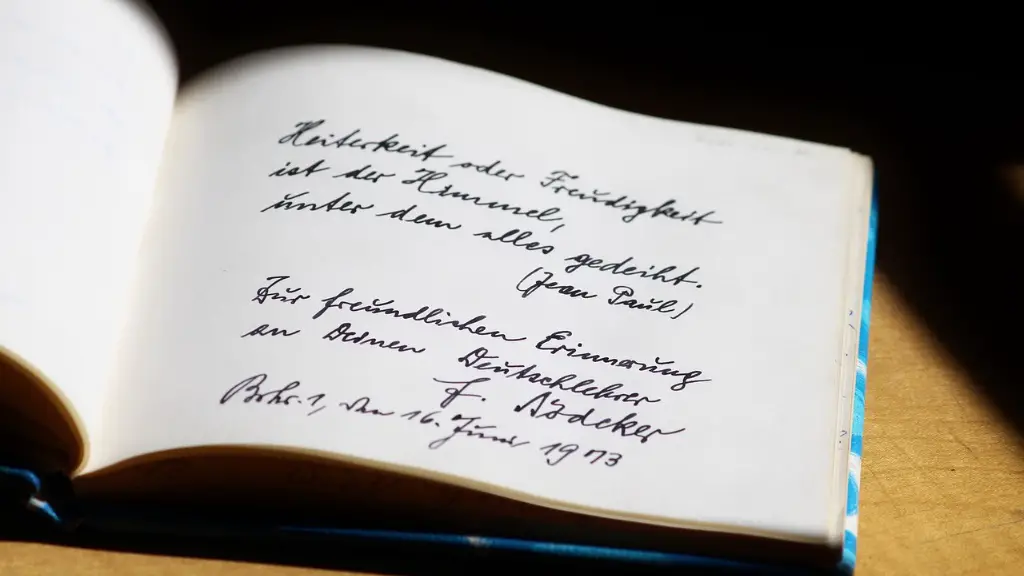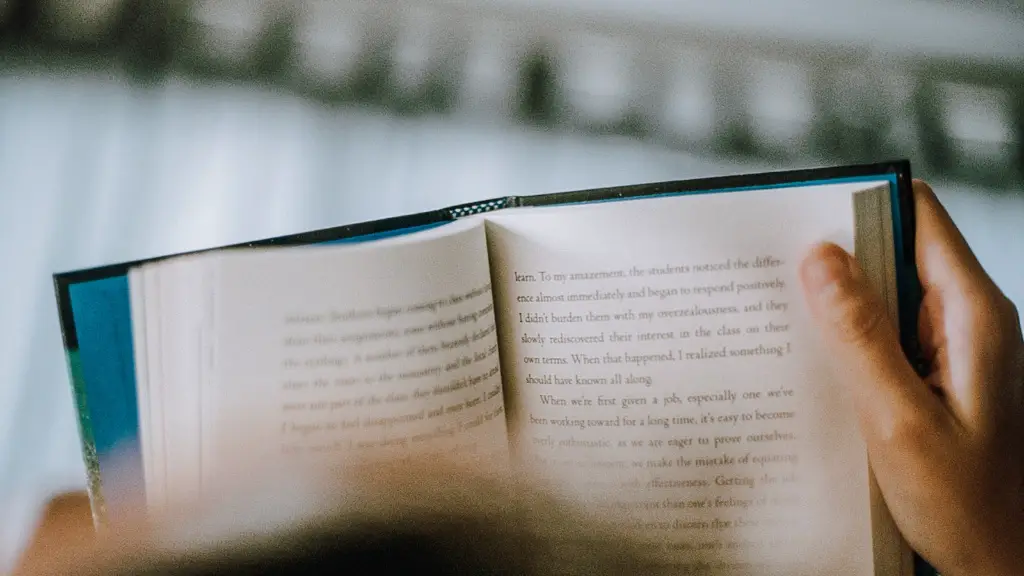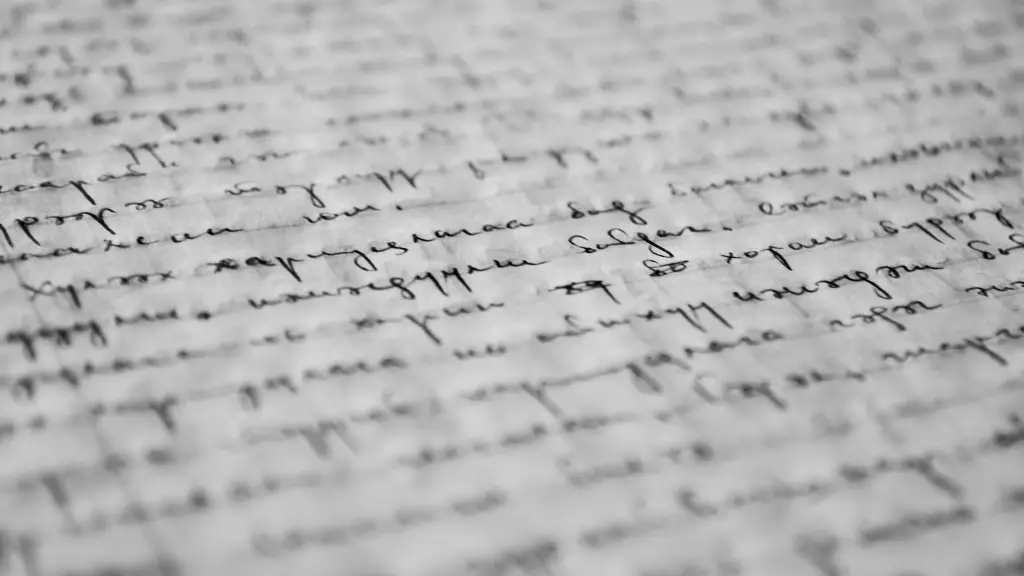Poetry has been around throughout history and is often used as an expression of emotion, opinions, and ideas. Its influence on modern culture and literature is immense as it stirs the soul, inspires us, and allows us to reflect on our existence. As an art form, poetry dates back to ancient civilizations, providing a voice for those with little opportunity to express themselves in other media. Poetic forms are found in many cultures and countries and can often bypass language barriers, uniting people under a single sentiment.
The beauty of poetry is the way it is able to express complex emotions and ideas. It can reveal the hidden depths of the human heart and soul, providing insight into the universality of emotions that are shared across the world. Poetry has the power to move people and inspire them to action, to draw out the inner truths that have been deep inside of us but may have forgotten.
Poetry has been around since the dawn of civilization and is often used as a form of protest or creative expression, as it can get across a message in a powerful and passionate way. It can be used to share opinions, to teach and inspire, to express deep beliefs, or to simply enjoy the beauty of language. From the ancient epics such as the Iliad and Odyssey to the works of Shakespeare, poetry has been used for centuries to express and explore the human experience.
But, why is poetry so important in our lives? According to experts, poetry is important because it allows us to express and explore emotions, thoughts, and feelings that we may not be able to express in any other way. It gives us a way to explore our innermost selves and to improve our emotional understanding of the world around us. Poetry also gives us a way to be creative and to use words to create something new and beautiful.
Poetry is often seen as a literary form, but its importance goes far beyond literature. It is a permanent part of our culture and is used in many different contexts and in many different ways. It is often used in music, movies, television shows, and art. Poetry can even be used in everyday life, as a way to express our feelings and emotions. It can be used to console and support people who are going through a difficult time, as well as to bring joy and beauty to everyday moments through its use of language.
In addition to expressing personal thoughts and emotions, poetry is also an important cultural tool. It serves to engage and educate people, providing insight into different views and perspectives. Poetry can be used to get people thinking and discussing topics such as politics, society, and the environment. Through its timeless messages, poetry can also provide inspiring messages to people of all ages.
Finally, poetry is important because it gives us a way to escape from the everyday world. Its beauty and power can transport us to a place of peace and joy, free from worry and stress. By sharing its words and messages, poetry offers us moments of beauty and respite in an otherwise chaotic world.
Different Types of Poetry
Poetry is a vast genre with many different forms, each with their own distinct characteristics and styles. Some common types of poetry include: sonnets, villanelles, haikus, sestinas, free verse, blank verse, epics, odes, elegies, ballads, limericks, and concrete poetry. Each of these has its own unique structure and purpose, and each can be used to create powerful and meaningful works of art.
Sonnets are a traditional verse form that feature fourteen lines in iambic pentameter. It has a regular rhyme scheme and a specific structure, which allows the poet to focus on the themes they wish to explore. Villanelles are another type of traditional poetry form featuring a repeating rhyme scheme, and it often tells a story. Haikus are a type of traditional Japanese poetry that follows a specific syllable structure and focuses on the beauty of nature. Sestinas are a type of poetry form featuring six end-words that are repeated throughout the poem, creating a specific pattern that ties it together.
Free verse is a type of poem that does not follow any specific form or structure, allowing the poet to explore their ideas and feelings with less restriction. Blank verse is often seen as a form of free verse, but it follows a specific underlying structure, specifically that the lines use iambic pentameter. Epics are a type of long narrative poem that typically involves heroic characters and important events, while an ode is a type of lyric poem celebrating some person, event, or thing. Elegies and ballads may also be seen as traditional types of poetry, as they both typically tell stories and have a specific meter and rhyme scheme.
The Role of Poetry in Society
The role of poetry in society is an important one, as it allows people to express their perspectives and feelings, while also providing a unique form of cultural expression. Through the use of poetic forms, people can explore and examine social and political issues, as well as providing insight into different cultures and beliefs. Poetry can also be used to share important lessons and messages, and can help inspire people to take action. By exploring the beauty and power of language, poetry also serves to bring joy and meaning to people’s lives.
Moreover, poetry can be used to bring people together and help promote understanding, respect, and dialogue between different cultures and ideologies. Its messages are often timeless and universal, providing a bridge between generations. It is even seen as a form of therapy, with many people turning to it during difficult moments in their lives for comfort and support.
In this way, poetry is an important part of our culture and society. It brings people together, helps to promote understanding, and allows us to explore powerful emotions and ideas. Through its universal messages, it has the power to move us and bring us hope. In a world that can often be chaotic and overwhelming, poetry serves to bring beauty and respite through its use of words.
Creating and Appreciating Poetry
Creating poetry is a powerful and rewarding experience, allowing people to explore their innermost thoughts and feelings. It can help people express and understand their emotions, as well as create something beautiful in the process. To begin, it helps to have some understanding of the different types of poetry, as well as its structure and purpose. Then, it is important to take some time to reflect on one’s feelings and ideas before beginning to write.
One then needs to decide if they want to follow a specific form, such as a sonnet or a villanelle, or if they would prefer to go the free verse route and simply allow their creativity to guide them. Poems often have a beginning, middle, and end, and it can help to think about each of these sections when constructing the work. The words and imagery used in a poem can help to create powerful imagery and evoke strong emotions, so it is important to think about this when constructing the poem.
Poetry can also be appreciated and enjoyed through simply reading or listening to it. There are many different types of poetry, from traditional to modern, and from serious to humorous. By exploring different styles of poetry and different types of poets, one can gain an understanding of the power of poetry and gain a deeper appreciation for different types of writing.
Common Themes Found in Poetry
Poems often explore universal themes and emotions, such as love, loss, hope, despair, joy, sorrow, and beauty. These themes can be expressed in a variety of ways and through a variety of poetic forms. Love poems, for example, can explore different types of love, such as romantic, platonic, and familial. Poems can also delve into philosophical questions and explore the human condition. Moreover, they often explore the natural world and its beauty, as well as the complexities and nuances of everyday life.
Themes such as death, grief, and mourning are also often explored in poetry, as are feelings such as anger and injustice. Hope and redemption are also common themes, as are those of peace, courage, and joy. Poems can be used to explore social and political issues, as well as to express spiritual beliefs and ideas. Ultimately, poems can provide deep insight into the human experience and often leave the reader with a new understanding or perspective on life and the world.
The Role of Poetry in Education
The importance of poetry in education has long been acknowledged, as it offers students the opportunity to explore language and their ideas. Through the use of poetic forms, students can gain insight into the power of language and the craft of writing. It offers them a way to express emotions and ideas, while also allowing them to gain insight into other cultures and perspectives. In addition, it serves as an important part of understanding literature, as a greater understanding of poetic forms and techniques can help to enhance one’s appreciation of literature.
By studying and appreciating poetry, students can become more aware of the beauty of language and can begin to explore the complexities of emotions. They can also gain a deeper understanding of ideas and themes, as well as familiarize themselves with different types of poetry and its structure. Poetry can also be used to explore a range of issues, such as identity, social issues, and political issues, as well as to inspire creativity and the use of language.
The Impact of Poetry in Today’s World
The impact of poetry on today’s world is vast and far-reaching, as it serves to bring together people from all walks of life. Through its words and messages, poetry helps to promote understanding and encourages people to express and explore their emotions. Moreover, its beauty and power can often provide relief and respite from the chaotic and overwhelming nature of everyday life.
In addition, poetry can help to bridge cultures and ideologies, allowing people to share their experiences and stories. In this way, poetry serves as an important vehicle for dialogue and understanding between different people and perspectives. Moreover, it often serves as a form of protest and resistance, as its powerful messages can often speak louder than words. Ultimately, poetry serves to bring people together and inspire them to embrace life and to strive for something greater.





